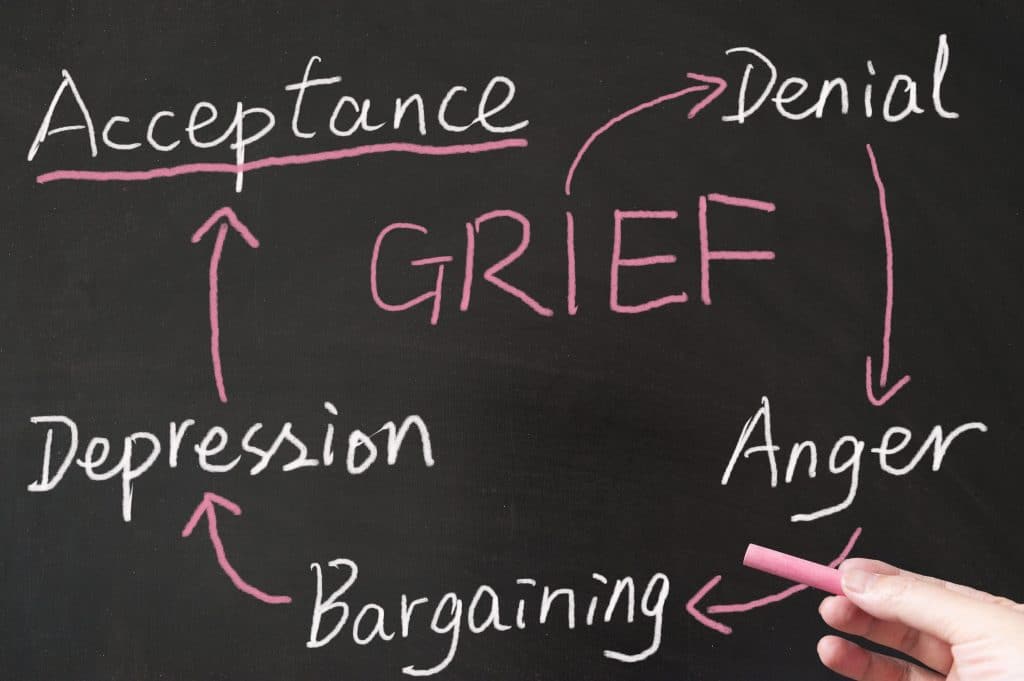
Throughout our lifetime we experience many instances of grief. Grief can be caused by certain situations, relationships, or even substance abuse and addiction. Children may grieve the divorce of their parents, a husband may grieve the death of his wife, one might grieve the ending of a relationship, or someone may have received a terminal medical diagnosis and they are grieving their impending death.
In 1969, psychiatrist Elisabeth Kübler-Ross described five popular stages of grief that are referred to as DABDA. This theory suggests that we go through five distinct stages of grief after the loss of a loved one: denial, anger, bargaining, depression, and finally acceptance. These, of course, can be applied to all other situations of grief and loss as well.
Denial

Shock and denial actually help individuals to cope and survive extreme grief. Instead of allowing oneself to become overwhelmed with grief, we deny it, do not accept it, minimizing its “full” impact at one time. It may, in fact, be our body’s own natural defense mechanism. As the initial shock and ensuing denial begin to fade, the healing process begins. Individuals may be overwhelmed with the feelings that they were suppressing as they begin to surface.
Anger
Once an individual starts to live in ‘actual’ reality again and not in ‘altered’ reality, anger might kick in. It is common in this stage to ask “why me?” and think “life’s not fair!” They might lash-out and blame others for their grief; redirecting their anger on friends and family. Most find it incomprehensible as to how something like this could happen to them. If someone is of strong faith, they might start to question their belief in God.
Many researchers and mental health professionals agree that this anger is a necessary stage of grief and encourage individuals to allow themselves to feel the anger. It is a known fact that suppressing feelings of anger and resentment is not healthy. Many will feel that their life has been shattered and there’s nothing for them to hold on to anymore. Anger may actually help individuals to “get back’ to reality. It in a natural and necessary step in the healing process.
Bargaining
You can probably remember a time when something bad happened and you made a deal with God. “Please God, if you let my father live, I will do ANYTHING!”. This is bargaining. This could also be called the stage of false hope. Individuals might falsely make themselves believe that they can actually avoid the impending grief through a “negotiation.” Many are so desperate to get their life back to how it was before the event, that they are willing to do just about anything. Guilt commonly accompanies the act of bargaining. This is when people find themselves constantly saying “what if” statements. What if I had let someone else drive me home – the accident would have never happened. What if I encouraged her to see the doctor when she first started complaining about the pain in her chest – the cancer could have been found sooner and she could have been saved.
Depression
Grief and depression have similar symptoms, so it can be hard to tell the difference. Dr. Michael Miller, the editor of the Harvard Mental Health Letter and assistant professor of psychiatry at Harvard Medical School, said that with both grief and depression: “People cry. They feel depressed. They’re having trouble sleeping. They may not have an appetite. They may not feel like doing anything. They may not take pleasure in anything.”
Depression represents the emptiness someone feels when we they are living in reality and realize the person or situation is gone or over; this may be abandonment, a relationship ending, death, or one’s health. In this stage, they may withdraw from life, feel numb, live in a fog, and not want to get out of bed. They don’t want to be around others, don’t feel like talking, and experience feelings of hopelessness.
Some may experience suicidal thoughts – thinking “what’s the point of going on?” There is no timeline for grief. In addition, cultural and circumstantial factors contribute to how people express and cope with it.
During a prolonged battle with a terminal illness such as cancer, as well as after the death of a loved one, a community of family, friends, and co-workers often unite to provide ongoing support to those who are grieving. People suffering from major depression continue to isolate themselves and keep themselves disconnected from others and may resist support and assistance. Those who don’t get the support that they need may be at a higher risk for slipping into clinical depression during the grieving process.
Acceptance
The last stage of grief identified by Kübler-Ross is acceptance. This does not mean that people are okay with their situation or loss, but in this stage their emotions may begin to stabilize. Individuals begin to come to terms with their “new” reality and they’re okay with it. It’s not a “good” thing, it’s certainly not what they wanted or expected, but it’s something they can live with. It is definitely a time of adjustment and fluctuating emotions. They will have ups and downs, good days and bad days, and then more good days. there will still be grief and sadness, but the good days start to outnumber the bad days. In this stage, people usually begin to feel the fog start to lift and start engaging with friends and family again. They may even join a support group with others who have shared similar experiences. This is the time to evolve into one’s new reality.


